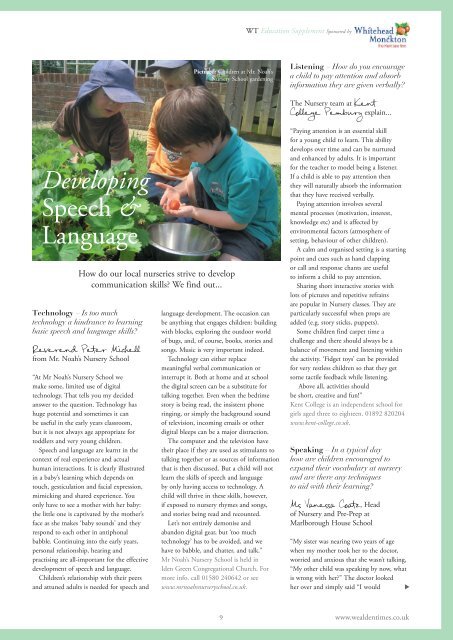Wealden Times | WT163 | September 2015 | Education supplement inside
Wealden Times - The lifestyle magazine for the Weald
Wealden Times - The lifestyle magazine for the Weald
Create successful ePaper yourself
Turn your PDF publications into a flip-book with our unique Google optimized e-Paper software.
WT <strong>Education</strong> Supplement Sponsored by<br />
WT Supplement<br />
Pictured: Children at Mr. Noah’s<br />
Nursery School gardening<br />
Listening – How do you encourage<br />
a child to pay attention and absorb<br />
information they are given verbally?<br />
The Nursery team at Kent<br />
College Pembury explain...<br />
Developing<br />
Speech &<br />
Language<br />
How do our local nurseries strive to develop<br />
communication skills? We find out...<br />
Technology – Is too much<br />
technology a hindrance to learning<br />
basic speech and language skills?<br />
Reverend Peter Michell<br />
from Mr. Noah’s Nursery School<br />
“At Mr Noah’s Nursery School we<br />
make some, limited use of digital<br />
technology. That tells you my decided<br />
answer to the question. Technology has<br />
huge potential and sometimes it can<br />
be useful in the early years classroom,<br />
but it is not always age appropriate for<br />
toddlers and very young children.<br />
Speech and language are learnt in the<br />
context of real experience and actual<br />
human interactions. It is clearly illustrated<br />
in a baby’s learning which depends on<br />
touch, gesticulation and facial expression,<br />
mimicking and shared experience. You<br />
only have to see a mother with her baby:<br />
the little one is captivated by the mother’s<br />
face as she makes ‘baby sounds’ and they<br />
respond to each other in antiphonal<br />
babble. Continuing into the early years,<br />
personal relationship, hearing and<br />
practising are all-important for the effective<br />
development of speech and language.<br />
Children’s relationship with their peers<br />
and attuned adults is needed for speech and<br />
language development. The occasion can<br />
be anything that engages children: building<br />
with blocks, exploring the outdoor world<br />
of bugs, and, of course, books, stories and<br />
songs. Music is very important indeed.<br />
Technology can either replace<br />
meaningful verbal communication or<br />
interrupt it. Both at home and at school<br />
the digital screen can be a substitute for<br />
talking together. Even when the bedtime<br />
story is being read, the insistent phone<br />
ringing, or simply the background sound<br />
of television, incoming emails or other<br />
digital bleeps can be a major distraction.<br />
The computer and the television have<br />
their place if they are used as stimulants to<br />
talking together or as sources of information<br />
that is then discussed. But a child will not<br />
learn the skills of speech and language<br />
by only having access to technology. A<br />
child will thrive in these skills, however,<br />
if exposed to nursery rhymes and songs,<br />
and stories being read and recounted.<br />
Let’s not entirely demonise and<br />
abandon digital gear, but ‘too much<br />
technology’ has to be avoided, and we<br />
have to babble, and chatter, and talk.”<br />
Mr Noah’s Nursery School is held in<br />
Iden Green Congregational Church. For<br />
more info. call 01580 240642 or see<br />
www.mrnoahsnurseryschool.co.uk.<br />
“Paying attention is an essential skill<br />
for a young child to learn. This ability<br />
develops over time and can be nurtured<br />
and enhanced by adults. It is important<br />
for the teacher to model being a listener.<br />
If a child is able to pay attention then<br />
they will naturally absorb the information<br />
that they have received verbally.<br />
Paying attention involves several<br />
mental processes (motivation, interest,<br />
knowledge etc) and is affected by<br />
environmental factors (atmosphere of<br />
setting, behaviour of other children).<br />
A calm and organised setting is a starting<br />
point and cues such as hand clapping<br />
or call and response chants are useful<br />
to inform a child to pay attention.<br />
Sharing short interactive stories with<br />
lots of pictures and repetitive refrains<br />
are popular in Nursery classes. They are<br />
particularly successful when props are<br />
added (e.g. story sticks, puppets).<br />
Some children find carpet time a<br />
challenge and there should always be a<br />
balance of movement and listening within<br />
the activity. ‘Fidget toys’ can be provided<br />
for very restless children so that they get<br />
some tactile feedback while listening.<br />
Above all, activities should<br />
be short, creative and fun!”<br />
Kent College is an independent school for<br />
girls aged three to eighteen. 01892 820204<br />
www.kent-college.co.uk.<br />
Speaking – In a typical day<br />
how are children encouraged to<br />
expand their vocabulary at nursery<br />
and are there any techniques<br />
to aid with their learning?<br />
Ms Vanessa Coatz, Head<br />
of Nursery and Pre-Prep at<br />
Marlborough House School<br />
“My sister was nearing two years of age<br />
when my mother took her to the doctor,<br />
worried and anxious that she wasn’t talking,<br />
“My other child was speaking by now, what<br />
is wrong with her?” The doctor looked<br />
her over and simply said “I would <br />
9 www.wealdentimes.co.uk


















